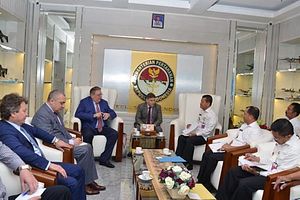On February 15, media reports began surfacing that a contract for Indonesia to buy fighter jets from Russia had been signed. The finalization of the deal, which has been talked about for years between the two longtime defense partners, would constitute a boost for Indonesia’s air force capabilities even amid the significant challenges that remain.
As I have noted before, Russia and Indonesia have long had a defense relationship, and Moscow today still remains Jakarta’s largest military supplier. Both sides have also been mulling several deals as well as broader advances in defense cooperation recently, looking at not just purchases but also more ambitious areas like technology transfers and joint development and production despite challenges therein (See: “Indonesia, Russia Ink Defense Protocol Amid Fighter Jet Deal”).
One of those deals that has been in the works for years is Russia’s sale of Su-35 fighter jets to Indonesia. Though Indonesia’s Defense Minister Ryamizard Ryacudu had officially announced that Indonesia had made a decision to buy the Russian aircraft back in 2015, since then, details of the allegedly impending deal have repeatedly changed and there had been no official confirmation of advances into 2018 (See: “Why is the Indonesia-Russia Fighter Jet Deal Still On Hold?”).
This month, we saw some advances on this front. First, last week, Mikhail Petukhov, the deputy director of Russia’s Federal Service for Military and Technical Cooperation who had headed Russia’s delegation to the 2018 Singapore Airshow, told TASS that Russia and Indonesia would shortly agree on technical details of a contract for delivery of the fighter jets to Indonesia.
Then, this week, on February 15, local media reports confirmed that both countries had finally arrived at a contract. Several Indonesian outlets cited Totok Sugiharto, the head of public communications of the Indonesian Armed Forces (TNI) as confirming that the signing had already taken place on February 14, even though no official press release was issued.
Few details of the contract were revealed in the reports. But the reports cited that the contract was for a total of 11 full combat Su-35 aircraft, and that the plan was for the jets to begin to arrive starting in October later this year.
Should the agreement move forward as planned, it would be a much-needed boost for Indonesia’s capabilities. As I have been noting in these pages, Indonesia has long been looking to replace some of its aging and malfunctioning aircraft as part of its wider military modernization (See: “Can Indonesia Speed Up its Military Aircraft Modernization?”).
It would also be in line with recent efforts to accelerate the military procurement process in Indonesia, which also has been a longstanding issue. As Air Force Chief of Staff Yuyu Sutisna told reporters, the inking of the contract would be a tangible demonstration of the efforts underway by Indonesia to accomplish this.






























